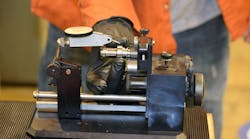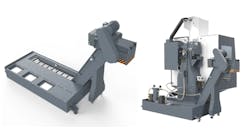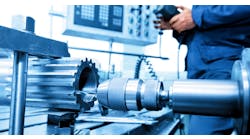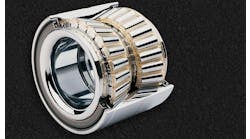Contract machine shops and OEMs rely on CNC machines to produce precision components for numerous manufacturing applications, for example in medical, aerospace, automotive, motorcycle, and defense manufacturing. However, consistently achieving precisely machined parts requires a high-quality retention knob, particularly for high-speed, high-volume milling operations.
In CNC milling machines, retention knobs are commonly used with tapered tool holders to engage drawbars that hold the tool holder firmly to the spindle. A tapered tool holder is threaded, to accept the retention knob, but any improper seating of V-flange toolholders costs manufacturers in lost productivity. It also causes run-out and vibration that reduces the precision of the machining effort, while reducing tool and spindle life. It is an unfortunately common problem in machining.
Beyond this, high-speed machining (in excess of 20,000 RPMs) is common in manufacturing aerospace, medical, and other precision parts, when machining exotic alloys and harder metals like titanium. At higher RPMs, accurate and secure seating of tapered toolholders in the spindle (with the help of the retention knob) is even more critical. It's so critical that failing to ensure the reliability of this single detail can decrease productivity, reduce precision machining standards, diminish tool life, and even damage workpieces.
That is why strong, well-manufactured retention knobs are so important. A superior product increases the rigidity of the set-up, which extends tool life and speeds cycle times — the measure of the time it takes to complete each part from start to finish.
The problem is poorly designed retention knobs, often imported and made of lower-quality steel that may be prone to breaking during machining. Newer CNC milling machines exert significantly more drawbar pressure on retention knobs than older units. As drawbar tension continues to increase in CNC machines, it puts so much pressure on a retention knob that it may be more likely to break if not manufactured to the highest standard.
Retention knobs may fail for other reasons too, including improper knob configuration, misaligned machines, metal fatigue, over-torqueing, and exceeding the machine's capability. That is why it is essential to inspect each retention knob periodically for signs of excessive wear, damage, or corrosion. If found, the retention knob should be replaced.
“We deal with a lot of aerospace companies, some with high-speed CNC applications with harder metals or alloys,” explained Bob Selleck, manager at SAG Supply, a Long Island, N.Y. provider of high-quality industrial tools, machinery, and accessories. “For that, you need a reliable retention knob that will last without breaking or moving. It needs to hold everything tightly in place with precision.”
Although many retention knobs look very similar, they are not interchangeable. The materials, coatings applied, and the quality of manufacturing are important differentiators. Another consideration is where the item is manufactured, given that some imports have a record of lower quality.
“Some [retention knob] imports do not always fit snugly or precisely in the flange, and may wobble or move a little bit under high-speed applications,” Selleck added.
The most reliable retention knobs are made with superior-quality steel and coated with black oxide, to prevent corrosion. In addition, the retention knobs should be subjected to the most rigorous quality control standards, including frequent inspection by the manufacturer.
As an example, Selleck cited T.J. Davies, an Ohio manufacturer of high-quality retention knobs that uses certified 86L20 and 9310 steel drawn in the United States. SAG Supply carries T.J. Davies retention knobs for their reliability at higher RPMs.
86L20, a low-alloy nickel, chromium, molybdenum case hardening steel, has high hardenability without temper brittleness, along with good external and internal strength, and high wear-resistance. However, if a CNC operator desires and even higher quality steel, they can choose a retention knob made of 9310, a low alloy steel composed mostly of nickel and chromium. This allow also has high hardenability, core hardness and fatigue strength, which makes it an excellent steel for use in heavy-duty machinery.
“We have found the domestic T.J. Davies retention knobs to be of higher quality and more reliable than imports,” said Selleck. “They do not break, They last longer, even at higher speeds with harder metals. We have carried them for over 10 years, and I have never heard of a problem or complaint.”
Long-term reliability also depends on a superior coating to prevent corrosion. For this reason, each retention knob is coated with black oxide: the top layer of the ferrous substrate material is chemically treated to prevent rust. Black oxide also increases abrasion resistance and provides a decorative finish.
“I have never seen one of the black oxide-coated retention knobs rust, and we sell a lot of them,” said Selleck.
If a retention knob ever needs to be replaced, it also helps to have quick shipping from a domestic supplier rather than dealing with lengthy overseas shipping and logistics. Manufacturers like T.J. Davies can ship items same day with no minimum order and will drop-ship to end-users on behalf of distributors.
“When I need retention knobs, I do not want to wait for overseas shipping,” said Selleck. “When I order domestically, I usually get what I need within two days.”
Because contract machine shops and OEMs require utmost CNC precision and productivity at all times, reliable retention knobs made with superior U.S. steel, coated with black oxide, can be a competitive advantage and a boost to productivity.
Del Williams is a technical writer on health, business, technology, and educational issues, in Torrance, Calif.






